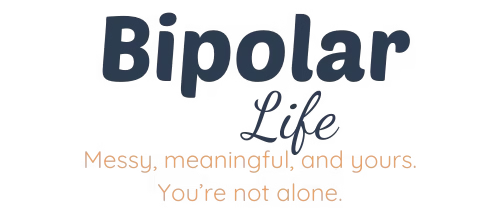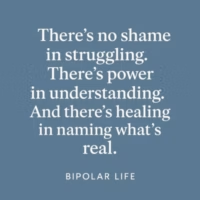I’m on Medication and I’m Still Me
There was a time when I believed that taking medication meant giving up some essential part of myself. I worried I’d lose my spark, my creativity, my edge. I was afraid that managing my bipolar disorder with medication would flatten who I was—that I’d become a muted version of myself, someone I didn’t recognize or respect. Even if others didn’t see me as someone different, the stories I heard—about people not feeling anything, losing their passion or drive—were scary. I didn’t want to become numb.
I know I’m not alone in that fear. There’s so much stigma around psychiatric medication—especially when it comes to bipolar disorder. People throw around phrases like “overmedicated” or “zombified” without understanding the cost of untreated symptoms. They assume we should just be able to control the rollercoaster of emotions and the side effects of those emotional spirals, as if willpower alone should be enough. And worse, we internalize those messages. We start to believe that we’re only valid if we’re raw, unfiltered, or “tough enough” to go it alone.
This post is for anyone who’s questioned whether they’re still themselves on medication—or even think that medication is not a good option, or that they’ll somehow be a failure if they need it. I want to tell you the truth as I’ve come to understand it: I’m on meds—and I’m still me.
The Fear of Losing Yourself
Before I started medication, the fear wasn’t just about side effects—it was about identity. I had gotten used to my intensity, my bursts of creativity, my quick thinking. Even when those things came with sleepless nights or spirals into depression, they still felt like me. The idea that medication might dull that scared me more than the disorder itself. The fear wasn’t just about losing myself—it was about knowing that medication might be a lifelong thing. That I might never get to be “me” again. And maybe most of all, the thought of taking medication made the diagnosis real. I could no longer pretend to be “normal.”
There’s this quiet myth that circulates: that if you’re medicated, you’re no longer the “real you.” That being authentic means feeling everything at full force, no matter the cost. But the truth is, you’re not automatically being authentic just because you’re unmedicated either. I spent years believing I was just a sensitive or emotional person, when in reality, I was deeply dysregulated and overwhelmed. For those of us with bipolar disorder, that can feel like a cruel bind—be stable and lose yourself, or be yourself and risk losing everything.
But here’s what I’ve learned: the unfiltered version of me wasn’t always the most honest one. And it wasn’t always the best version, either. It was a version shaped by imbalance, survival, and exhaustion. It took me time—and a lot of trial and error—to understand that managing my mood doesn’t erase who I am. It allows who I am to finally breathe. To be the best me—truly honest, strong, and confident in myself, not the illusion given during spirals.
What Medication Actually Does
There’s this idea that psychiatric medication changes who you are—makes you a more perfect, happy, productive person. But what I’ve found is that it doesn’t change me—it supports me. It slows the chaos just enough for me to hear myself clearly. It gives me a little more space between thought and action, between feeling and reaction. It doesn’t erase my personality—it gives it room to show up without being drowned out by constant emotional storms. It’s not like the commercial where you go from being sad-while-pretending-to-be-happy to suddenly skipping in a field of flowers. It’s quieter than that. More real.
What medication actually does is help stabilize the neurological patterns that make bipolar disorder so unpredictable. It helps with a medical problem—just like insulin does for diabetes or medication for high blood pressure. It’s not about dulling emotions; it’s about reducing the intensity to a manageable level. I still feel joy, excitement, passion, sadness—but I’m not held hostage by them. I’m no longer constantly waiting for the crash or the surge. I have more consistency, which gives me more freedom.
And yes, it took time to find the right medication—and I still monitor side effects, check in with my doctor, and adjust as needed. But what I gained is worth it. I can make decisions with clarity. I can rest. I can trust myself more. That’s not a loss—it’s a reclaiming.
Reclaiming Your Identity on Medication
One of the most surprising things about being on medication was realizing I actually got to know myself better—not less. Without constant emotional extremes pulling me in opposite directions, I had the space to explore who I really was beneath the symptoms. Turns out, I’m still passionate, still creative, still full of feelings—but those parts of me are steadier now. I not only still have all those traits, I’ve found more—things I now explore and develop. These “new” parts weren’t really new at all; they were just buried under overwhelm or dismissed because an episode would ruin the gifts I thought I had.
Being medicated didn’t strip away my depth. In fact, it gave me tools to access it more fully. I can reflect more clearly. I can be present without being overwhelmed. I can show up in relationships with more intention. Medication didn’t flatten me—it helped me unfold. It gives me a freedom to feel—I don’t have to worry that being “happy” will be seen as manic or hide my happiness out of fear that it means I’m out of control. I can love myself more fully, because now I honestly know who I am—the person beneath the spirals.
It’s easy to confuse instability with intensity, especially when so many of us are used to equating drama with authenticity. But drama is also often labeled as fake—as just a bid for attention. So you’re caught either way: you’re too sensitive, too unstable, or you’re exaggerating and manipulative. It’s a no-win narrative. But being regulated doesn’t make you boring or fake. It makes you powerful. It makes your emotions your own again—not something that controls you or defines your worth.
Dealing with Judgment (from Others and Yourself)
People have opinions about everything—and when it comes to mental health, especially medication, those opinions can be loud, uninformed, and deeply personal. Some people ask, “Do you really need it?” Others wonder aloud if you’re “still yourself.” You might even hear, “But you seem fine without it,” as if visible struggle is the only valid reason for treatment. And sometimes, you’ll hear the most dismissive question of all: “Are you even bipolar?”—as if not having witnessed your episodes means they couldn’t have happened, and your diagnosis must just be an attempt to seem special or to gain help or accommodations you haven’t “earned.”
Even well-meaning people sometimes say hurtful things because they don’t understand. Those closest to you may be the biggest naysayers. They may minimize your experience, assume you’re “fixed,” or question your choices when you set boundaries or talk about side effects. These moments can make you second-guess yourself, especially if you’re still navigating what stability looks like for you. And stability does look different for everyone—which makes the fight to find your own even harder when someone else insists on defining it for you.
And then there’s the internal judgment—the one that whispers you’re weak for needing help, that you’re cheating by using medication, that you should be able to handle this on your own. That voice can be the hardest to quiet. But here’s what I remind myself: taking care of your mental health isn’t a failure. It’s a form of strength. Even asking for help makes you stronger. Choosing medication isn’t giving up—it’s choosing to live with intention, not survival mode.
I’m Still Me
If you’re considering medication, already on it, or struggling with the idea of it—please hear this: you are not less of yourself because you’re treating your mental health. You are not a failure. You are not fake. You are someone making a brave, informed decision to live better. You are taking care of your health—because mental health is health. And mental health can impact so much of your physical health too. Prioritizing your brain is not weakness—it’s wisdom.
I’m still me. In fact, I’m more me than I’ve ever been. Clearer. Calmer. More able to love, create, connect, and reflect. The parts of me I was most afraid to lose didn’t disappear—they had room to grow. I can love myself more because I finally know who I am—the person beneath the spirals. And if medication helps me live that truth more fully, I will never be ashamed of that choice.
If you’re walking this path too, I see you. You’re not alone. And you’re still you—not in spite of medication, but alongside it.

